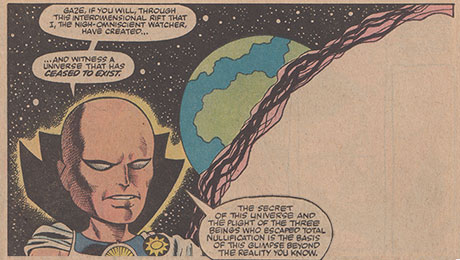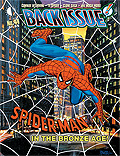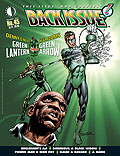 Doug: Have at it, effendi! As we've done several times in the past, whoever is first to comment sets the topic du jour. Anyone else in later -- play nice and stick to our guest-moderator's thread choice. That being said, I think the last time we did this we actually ended up with multiple topics going due to two eager beavers getting in on this at about the same time. But for simplicity's sake, we'll stick to our usual rules.
Doug: Have at it, effendi! As we've done several times in the past, whoever is first to comment sets the topic du jour. Anyone else in later -- play nice and stick to our guest-moderator's thread choice. That being said, I think the last time we did this we actually ended up with multiple topics going due to two eager beavers getting in on this at about the same time. But for simplicity's sake, we'll stick to our usual rules.Enjoy!


















































17 comments:
How important is continuity ?
To me continuity is very important and it's one of the things I loved about Marvel's shared universe. I love Peter David's quote which is used on the Marvel Appendix website :
"A shared universe, like any fictional construct, hinges on suspension of disbelief. When continuity is tossed away, it tatters the construct. Undermines it."
-- Peter David
Continuity seems much less important to Marvel today. I understand that there has to be a balance between the commercial side of comics and the creative one. Marvel's sliding timeline and DC's events from Crisis On Infinite Earths through the New 52 are attempts to keep comics alive and selling as well as keeping the stories fresh.
Revamps and retcons are all part of the process and I understand this but I feel the demise of continuity is due more to writers and editors who don't know or care what came before as well as just being plain lazy. Writers don't need to be slaves to continuity because good stories come first. John Byrne had some interesting points about this in Comics Interview # 71. Good writers can work with the established continuity and sometimes bend it enough to accommodate the story and stay true to what came before.
I also feel that overused characters like Wolverine and the constant need for the big events also hurt continuity. An example of this was Dr. Doom a couple of years ago. He was in Fantastic Four, the Incredible Hulk, Doomwar etc. When the character returned to the Fantastic Four the only events that were acknowledged were those in The Incredible Hulk. The previous story by Mark Millar in the Fantastic Four was completely ignored. Whether you loved the story or hated it is open to debate. Most people seemed to have disliked it. I loved it by the way. By hey if the story doesn't exist anymore shouldn't I get my money back ? ( Just kidding ) Peter David had an interesting way of dealing with Bruce Jones tenure ( which most Hulk fans hated )on The Incredible Hulk whick at least acknowledged the stories that were being retconned.
An example of lazy writing ( and editing ) was Jeph Loeb's Fall Of The Hulk's story where the Red Ghost kidnaps the Black Panther from Wakanda. He does it with ease while the same month in Doomwar we are told how impregnable Wakanda is. Doom himself needed the help of dissident factions within the country to achieve his goals. Back in the 70s Marvel would have linked those 2 stories together and given us a plausible reason for the ease of T'Challa's abduction. And there would have been footnotes. That in itself was a sign of an editor doing his homework.
One final thought. I loved how back in 1978 the Beast was featured in 3 books, albeit only 2 writers and his progress from one to another is clear and footnoted.
I have mixed feelings on continuity. Establishing it between different comic books was one of things that separated Marvel from the pack and one of Stan Lee’s smartest conceits.
It gave the Marvel universe a real “lived-in” feeling that events in one comic were referenced and commented on in another. That in tern enhanced the stories since events seemed to have more consequence. By the time the Bronze Age came along they had created a really rich – and mostly seemless – tapestry of storytelling.
Prior to that individual comics had little connection to the world outside that particular series – and even from issue to issue within the series. I mean, Superman would visit an Atlantis in his comic that was completely different from the one that Aquaman knew even though both of them also appeared in Justice League. This made it harder for readers to get invested in the stories because you knew at the end the writers would just the reset button and it would be like nothing had happened before.
I understand that writers could find continuity frustrating though. I read an interview where Marv Wolfman said he hated it because it bound the best writers to follow the work of the worst. (No wonder he wrote Crisis on Infinite Earths.)
And there is something to be said for casting aside continuity in favor of a fun story. Those Bob Haney-Jim Aparo The Brave and The Bold issues are a real hoot even if there is no way they can be considered canonical.
Continuity also creates a problem with timelines. The Marvel universe originally moved forward in real time. I mean, you could still read stories about the Thing being a WWII veteran as late as 1980. Shortly after that they quietly ditched that for floating timelines which itself undermines the concept of continuity.
It was when continuity began to seriously unravel around 1990 or so that I began to lose interest in comics. The serial retcons and relaunches of some series while others remained unchanged tried my patience. It became impossible to figure out what was canonical and what wasn’t.
Maybe the best thing to do is to work with continuity for a while and then hit the rest button, oh, every quarter-century or so.
Now that I'm not a regular reader of comics (that is, I don't currently follow any books), continuity is less of an issue for me. Since I don't read in a linear fashion much any more, a good story with solid art is my priority. Whether or not the dots are connected over a long period of time is less important to me now than when I actually was buying several books on a consistent basis.
Doug
Continuity is important to me.
When I was a kid, I always loved it when Spider-Man would be fighting a villain and he'd say something like "Maybe the Fantastic Four can help me". In the same panel there would be a note telling the readers that the FF weren't available because they were in the Negative Zone(or wherever) that month.
I've said before, the last remnants of the Marvel I grew up with disappeared when Mark Gruenwald died.
He was their long-time continuity cop and did a pretty good job of keeping the all the characters & storylines of the Marvel Universe connected. If Gruenwald still worked at Marvel, we would never have seen Spider-Man's marriage annulled by Mephisto.
I remember how Byrne(during his tenure on the FF) dealt with Doom showing up in non-Byrne books:
Unless he wrote the story, it was a Doom-bot.
Remember this?:
http://goodcomics.comicbookresources.com/2009/12/22/meta-messages-1/
Slightly off topic, but whenever comics continuity comes up, I can't help but think of this essay by Dwayne McDuffie:
http://dwaynemcduffie.com/?p=47
Continuity is what makes a series of stories about characters an actual series, not just a string of stories with some common elements.
Continuity is also a beneficial restriction on a writer, a filter of sorts which separates the creative and inventive writers from those who are dependent on certain plots and formulas.
SRS
I love the Haney Brave and Bold stories--that's the real Batman! Haha, not necessarily, but I like that he puts his stamp on Batman, and he gets away with odd inclusions because he's a super writer with his own style. The Bronze Age had the right amount of continuity, and it was cool that things developed over time.
I found later that continuity became a burdensome necessity rather than a cool bonus. Stories and creativity suffer when everything must fit this extensive past. I wasn't a fan of Crisis on Infinite Earths--all the Earth 1, Earth 2, Earth z or whatever was great creative fun. The Shazam world, the Freedom Fighters' world where Nazis won WW2--for the heroes to visit these place occasionally was a trippy experience. Crisis was the beginning of comics getting too serious and inbred--like the diminishing returns of the Star Trek franchise with each new series. At first it's interesting--Next Generation was good--then it gets duller and more insular instead of being fun stories for everyone, like good ol Captain Kirk!
I vote for low to moderate continuity, and if someone wants to
mess with it because they have a great weird story to tell--go for it! Oops this isn't a vote? Where is the button...I'm getting addicted to voting here. :)
Since I also don't follow any regular series any more, I'm with Doug on this one - at this point continuity is almost irrelevant. However, it was really important to me in my comics-reading heyday, and like several others noted, Stan Lee's introduction of that specific Marvel continuity was a real draw for the young comics reader. One thing I also liked was Marvel's 'sliding timescale,' which was sort of a continual soft reboot - it seemed to function well before, although I can't comment on how it's working in the present day.
By the way, I'm not sure I agree with Garett's characterization of the Star Trek franchise: I did like Next Gen, but my favorite spin-off series was actually Voyager...
I think Marvel were victims of their own success. I don’t think, reasonably, you could expect Stan to sit there in 1961 and say ‘now, hang on a second, Jack....can Ben actually become Blackbeard....because 50 years from now, when hundreds of characters have participated in thousands of stories and millions of incidents and events, it might not make sense...let’s just call him Purplebeard to be on the safe side’.
Having said that, there’s a note, I think almost literally in FF#1, which talks about Reed and Ben going off to war (seemingly WW2) and Reed thinking about the ‘girl he left behind’ and there’s a editor’s footnote that says ‘hey, Reed must fought in Korea too, because Sue’s not that old!’.
She is now, Stan.
I think actually that Roy Thomas and Mark Gruenwald were the real Continuity Cops. Where most of us used to write & draw our own comics with thinly veiled replicas of our Marvel faves (oh come on, we all did it) but Gruenwald started with Omniverse, which was a fanzine specifically DEDICATED to continuity. Jeez, I think we’re all pretty nerdy here at BAB, but, let’s face it: we are not worthy compared to MG. The Marvel Handbook that he wrote was originally supposed to be an in-house project for the writers until they realised they could easily sell it to us.
Everyone so far is talking about the impact of bad continuity on plot, but it has just as much impact on character. Some characters are carefully nurtured through years of development by one writer and then butchered into a 2 dimensional cartoon by the next, or start behaving as they did 10 years ago, which makes it pretty clear that the new writer has a simply read a bio from when the character was created and wiped out everything that has happened for a decade or more at a stroke.
I disagree with Doug and Edo as I think continuity is important but I don’t see why it was to be so ludicrously time-specific. I couldn’t believe it when Claremont specified the date & time of Jean’s death. He was writing Xmen in the 80’s. If he was following real time, then the originals would have been pushing 40 by that point (and over 65 by now) and spent the first half of the 70’s in a collective coma. He clearly disregarded ‘real-time’ issues when it suited him, so why go out of his way to create a future continuity issue? And as to Days of Future Past, well, great story, but the more universes & alternate time streams you create, the more you dilute any tension, reality or character/plot development. Lost your girlfriend, Scott? Well, just go back in time and kill Larry Trask. Job done. Or jump over to another dimension where you got killed and she didn’t. Or have her cloned a few times. Oh no, wait, that actually happened.
Buckler, writing in the mid 70’s set Deathlok firmly in 1990. That is now further into the past than it was (in 1974) into the future.
Why do we need dates attached to everything? It would be a lot easier to maintain continuity if it existed in a bubble which was entirely consistent with itself, but disregarded real time.
Richard
Just had the disturbing thought that at some point, Captain America will be considered to have been revived after 9/11.
I think the Avengers film next summer will solidify that proposition, Karen. Witness the "wake up" at the end of this summer's Cap film. No doubt it was 2011 when he walked out into Times Square.
Doug
Hi Edo
I actually liked some of Voyager too, especially at the beginning. The idea that they were out into the unknown again like the first series was a great premise. I felt that the Trek universe had become too safe and comfortable compared to the wild west of Kirk's day.
Good continuity was one of the things that got me hooked on Marvel comics so long ago. It was part of the fun and made me feel these characters were somehow "real" rather than pure make-believe.
Regarding Karen's comment about Captain America and 9/11, well, time does march on, as the ancient newsreels put it, and now the first Gulf War is further in our past than the end of WWII was when Stan & Jack brought Cap back and had to come up with a way to keep him from seeming too old!
Just to reply to Richard, I guess my comment made it seem like I don't think continuity is important - what I meant is that to me personally now, given my comic reading/buying habits, it's not important. However, I do agree that it is really important in shared universe comics, and like I noted, it was one of the draws when being a total Marvel-boy comics-reading kid.
Basically Richard also kind of makes the same point I do about the sliding timescale, i.e., I agree it's better for writers to avoid actually putting specific dates on events in their stories if they can. And when they do, it's a good idea for subsequent writers to elegantly ignore mentioning them (e.g. in Spider-man, Flash Thompson joined the army and served in Vietnam - eventually this detail just kind of got shoved into the background and forgotten...)
I have a theory about that.
I divide continuity into two types -- "Light Continuity" and "Dark Continuity".
Light Continuity is that which is vital and adds to the overall understanding of a fictional universe. Roy Thomas, a master of continuity practiced this most elegantly when he took Jack Kirby's disparate Eternals concept and blended it successfully with the overall Marvel mythology creating a whole stronger than the sum of its parts.
Likewise Roy practiced Dark Continuity when in All-Star Squadron he spent pretty much an entire issue explaining Sandman's costume changes. Sheesh!
One type opens up story ideas, the other solves relatively meager and picayune problems which seem to bug only a few folks.
Rip Off
I'm a big fan of continuity. Some call me fanatical about it. Without continuity, there is no cohesive bond linking the fictional universe we read about.
If Thor is shown as being stronger than the Thing in an issue of Thor this month, but next month the Thing is shown as being stronger than Thor in an issue of FF, then there's nothing but confusion and silliness. It becomes a make-it-up-as-you-go-along nightmare.
Retcons are ok, if they are done well, and in fact are probably necessary (ie Doc Ock dies in this issue, how does he appear again 20 issues later?). It's part of comic writing. Done well, it works. Done poorly (resurrection of Jean Grey, Gwen Stacy clone, etc), it simply destroys the value of the original story.
Most retcons since from the 80's onward just suck.
Post a Comment